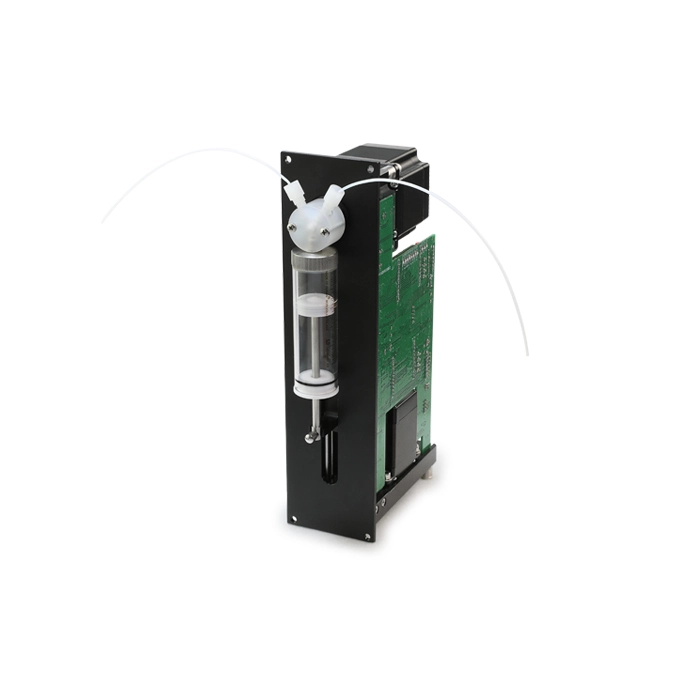An industrial micro syringe pump is a precision fluid dispensing device that utilizes a syringe as its primary component. It is designed for industrial applications that require highly accurate and controlled dispensing of small volumes of fluids.
Here are some key features and characteristics of industrial micro syringe pumps:
- Syringe-Based Dispensing: The core component of an industrial micro syringe pump is a syringe, typically made of glass or high-quality plastic. The syringe serves as a reservoir for the fluid to be dispensed and provides precise control over the dispensing volume.
- High Accuracy and Precision: Industrial micro syringe pumps are known for their exceptional accuracy and precision in fluid dispensing. They can achieve very precise dispense volumes, often in the microliter or nanoliter range, making them suitable for applications that require precise dosing or microfluidic experiments.
- Programmable Dispensing Parameters: Many industrial micro syringe pumps offer programmable dispensing parameters, allowing users to set precise flow rates, dispensing volumes, and dispensing patterns. This programmability enables automation, repeatability, and control over the dispensing process.
- Microstepping Control: Micro syringe pumps often employ microstepping control mechanisms, which enable fine adjustments in the plunger movement. This granular control allows for precise control of flow rates and dispensing volumes, even at low flow rates or when handling highly viscous fluids.
- Multi-Channel Capabilities: Some industrial micro syringe pumps are designed with multiple channels, allowing for simultaneous dispensing of multiple fluids. This feature is particularly useful in applications that require mixing, sequential dispensing, or parallel processing.
- Integration with External Devices: Industrial micro syringe pumps can be integrated with external devices or systems to enhance their functionality and control. They may have communication interfaces or protocols that enable connectivity with control systems, data logging, or synchronization with other equipment.
- Versatile Fluid Compatibility: These pumps are compatible with a wide range of fluids, including aqueous solutions, oils, solvents, adhesives, and other liquids commonly used in industrial processes. The choice of syringe material and seals can be selected based on the fluid’s compatibility and chemical resistance.
- Pressure and Vacuum Control: Some industrial micro syringe pumps offer pressure and vacuum control capabilities. They can generate adjustable positive or negative pressures to facilitate fluid transfer, aspiration, or withdrawal processes.
- Easy Syringe Replacement and Cleaning: Industrial micro syringe pumps are designed for easy syringe replacement and cleaning. This feature simplifies maintenance, reduces downtime, and allows for quick changes between different fluids or experiments.
- Robust and Durable Construction: These pumps are typically built with robust and durable materials to withstand industrial environments. They are designed for continuous operation and can handle demanding applications that require long-term reliability and stability.
Industrial micro syringe pumps find applications in various industries, including pharmaceuticals, biotechnology, chemical research, electronics manufacturing, and more. They are used for tasks such as precision dispensing, sample preparation, microreactor filling, microfluidic experiments, Industrial Micro Syringe Pump and other industrial fluid handling processes that demand high accuracy and controlled dispensing.
Here are some additional details about industrial micro syringe pumps:
- Syringe Sizes and Volume Range: Industrial micro syringe pumps are available in different sizes to accommodate various syringe volumes. Common syringe sizes range from microliters to milliliters, allowing for a wide range of dispensing volumes. The pumps may support interchangeable syringe sizes for flexibility in different applications.
- Flow Rate Control: Industrial micro syringe pumps offer precise control over flow rates, allowing users to adjust the dispensing speed according to their specific requirements. This control is essential for applications that demand different flow rates, such as microfluidic experiments or processes requiring varying dispensing speeds.
- Stepper Motor or Servo Motor Driven: The plunger movement in industrial micro syringe pumps is typically driven by a stepper motor or a servo motor. Stepper motors provide precise step-by-step movement, while servo motors offer continuous and smooth motion. The motor type used depends on the required accuracy, speed, and application needs.
- Pulsation-Free Dispensing: Industrial micro syringe pumps are designed to provide pulsation-free dispensing, ensuring a smooth and continuous flow of fluids. This is particularly important in applications where pulsation can affect the accuracy and consistency of the dispensed volumes or when working with sensitive samples.
- Automation and Integration: These pumps can be integrated into automated systems or controlled through external devices such as computers or programmable logic controllers (PLCs). Integration allows for precise control and coordination of multiple processes, enabling efficient and synchronized operations in industrial settings.
- Calibration and Calibration Memory: Industrial micro syringe pumps often have calibration features that ensure accurate and reliable dispensing. Some pumps offer calibration memory, storing calibration data for different syringe sizes or specific applications. This simplifies the setup process and ensures consistent performance.
- Safety Features: Depending on the application and industry requirements, industrial micro syringe pumps may include various safety features. These can include features like pressure limits, overpressure protection, syringe clamping mechanisms, and emergency stop buttons to prevent accidents or damage during operation.
- User-Friendly Interfaces: Industrial micro syringe pumps typically have user-friendly interfaces, such as LCD displays, touchscreens, or keypad controls. These interfaces allow for easy programming, monitoring, and adjustment of dispensing parameters, enhancing the user experience and simplifying operation.
- OEM Solutions and Customization: Manufacturers of industrial micro syringe pumps often provide OEM solutions and customization options. This enables the adaptation of pumps to specific requirements, including the integration of additional features, modification of control options, or customization of the physical design to fit specific equipment or systems.
- Technical Support and Service: Reputable manufacturers of industrial micro syringe pumps offer comprehensive technical support and after-sales service. They provide assistance with installation, training, troubleshooting, and maintenance, ensuring that the pumps operate optimally and reliably throughout their lifespan.
When considering an industrial micro syringe pump, it’s important to evaluate factors such as the required volume range, accuracy, flow rate control, integration options, compatibility with fluids, and any industry-specific standards or certifications that may be necessary for your application.
